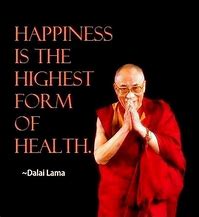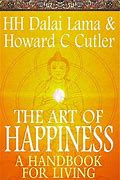
The purpose of a knife is to cut. The purpose of a racehorse is to run. The purpose of a human, according to Aristotle, is to pursue happiness. By “happiness,” he meant not just joy, but wealth, health, friendship, and knowledge. Of the virtues that allow us to achieve happiness, Aristotle valued reason most.


Moments of Happiness
'Happiness is often an elusive experience - people will go to great lengths for a fleeting moment of happiness. Even the U.S. Declaration of Independence, written in 1776, asserts the right to Life, "Liberty and the pursuit of Happiness”.
Can happiness lead to a healthier, longer life? Koopmans et al (2010) conducted a 15-year longitudinal study into the happiness of elderly people, known as the Arnhem Elderly Study. They found higher levels of happiness in those who lived longer.
But does happiness lead to a longer life or does good health and longevity give people reason to be happier? The researchers also accounted for the participants’ levels of physical activity and found that, once exercise was accounted for, the link between happiness and life span was insignificant. This indicates that happiness may lead to increased physical activity, which in turn can be beneficial."
How to Celebrate the Little "Moments of Happiness"
You don't need decorations or presents to savor a great moment. Just follow these steps and soak up the good feelings created when you are remembering or observing these moments:
These could be what is it that you are proud of? What have you or loved one achieved recently? What do you like about your or another person's life? Where is your good energy flowing? Notice what is working in your or other person's life, and you'll find something to celebrate. Perhaps a check came, or you finished a tough project or handled a challenging moment with your child in a healthy, positive way. Maybe you helped someone else or found the courage to enroll in a healthcare education or workshop program to make someone's life healthy and happy.
Sometimes it may be a good idea to celebrate Living Memorials of those who continuously provide happiness and memories of good moments, which makes others' lives happy.
They will be about people whose lives are adventurous, colorful, complicated, desirable, rightening, generous, harsh, helpful, humble, idealistic, inspiring, intense, joyful, mysterious, quiet, radical, sharp, and taking you to live a particular lifestyle whose feelings depending on how you see and experience them yourself.
People around the world have created memorials to honor those who have departed. While there has been a noticeable evolution of ceremonies over time, this ritual has persisted for centuries. So, why do we establish celebrations in the present day? Some create services to grieve their loss; others create parties to honor the life of the deceased. No matter the reason, establishing these tributes can be an immensely healing process.
"The happiness-health connection
Want to feel better and improve your health? Start by focusing on the things that bring you happiness. Scientific evidence suggests that positive emotions can help make life longer and healthier.
But fleeting positive emotions aren't enough. Lowering your stress levels over a period of years with a positive outlook and relaxation techniques could reduce your risk of health problems.
Pathways to happinessIn an early phase of positive psychology research, University of Pennsylvania psychologist Martin Seligman and Christopher Peterson of the University of Michigan chose three pathways to examine:
Our susceptibility to disease increases as we grow older. Therefore disease prevention and health promotion become an essential part of the management of disease processes and clinical decision-making to improve patients' care. Extension of a healthy life through slowing aging has a dramatic effect on all of the diseases and disorders expressed in later life. This may be why some people may live a healthy life for a long time or never seem sick as compared to others. As written above, happiness may lead to increased physical activity, which can increase the life span.
What Does It Really Mean to Be Happy? 6 Experts Explain read more. . . .
PURSUIT OF HAPPINESS
By Lalit Kapoor
The pursuit of happiness is the main preoccupation of all living organisms from a single cell to the giant blue whale. At the human level, we had thought for over a century that happiness is experienced at the brain level, and the whole field of psychology evolved to understand the malfunctions of the mind. Recent research has shown that this is not true, and every cell in the human body is searching for happiness and compensates under conditions of adversity.
Research has also shown that specific inherited genes seem to account for only half of our happiness. The other half depends upon the choices we make.
HAPPINESS CHEMICALS
Four primary chemicals in our body affect happiness: dopamine, oxytocin, serotonin, and endorphins.
* DOPAMINE is the feel-good hormone released when we eat the food we desire or when we have sex. However, that is a big misconception. Dopamine is involved more with ‘anticipation’ than the actual ‘happiness’ feeling. It boosts mood motivation and attention and helps regulate emotional responses. It is also described as a striving emotion.
* OXYTOCIN is the neurochemical that has allowed us to become social creatures. It makes us feel empathy, which helps us feel close and bonded to others when released. Oxytocin is made in the hypothalamus part of our brain and stored in the pituitary gland.
* SEROTONIN is the hormone that helps regulate mood and social behavior, appetite and digestion, sleep, memory, and sexual desire and function. A link is also suspected between serotonin and depression. Eighty percent of serotonin exists in the gut and is governed by one’s state of hunger (yes, this is why you’re hungry).
* ENDORPHINS act as analgesics, which means they diminish the perception of pain or discomfort. This explains their association with the “fight or flight” response. When it comes to desiring happiness, endorphins help you “power through.” For example Endorphins allow a runner to push farther and harder as he works towards his goals.
Some of the natural ways to boost Happiness hormones are:
* Listening to Music
* Eating Carbs
* Spending Time with loved ones
* Physical Exercise and Yoga
* Pranayama
* Meditation
* Prayers
* Helping others by doing social work
( I have let the secret out, now you know why I run these health groups.)
When we pray with a sense of gratitude, oxytocin is released in our body, which gives us happiness, and that acts as a positive feedback loop that encourages us to pursue that path even more strongly.
When we change our diet to PBWF and start Intermittent Fasting and walking 10K steps, changes happen, not only in our body but also in the psyche.
Plant-based whole food is what Krishna refers to as Satvic in Geeta. Satvic foods bring forth satvic thoughts in our minds. Satvic thoughts are positive thoughts and promote happiness by releasing happiness hormones.
Human beings have three different tendencies in them; Satvic, Rajasic, and Tamasic. Our diet and lifestyle affect the hormonal balance in our body, which in turn affects our psyche and actions. This is covered in some capacity in all religious scriptures. In Bhagavad Geeta, chapter 14 is devoted to this subject. I quote here to verse 5:
“Sattva (purity), Rajas (passion) and Tamas (inertia) - these Gunas (qualities), O Arjun, are born of Prakrti (nature), and they bind the indestructible soul (consciousness within us) to the body.”
This is my favorite subject, and as you can see I am passionate about it having spent 15 years under the tutelage of Swami Chinmayanand